The two words ‘wild camping’ can strike fear into the heart of even the most willing adventurer. Where do I go? What do I take? Is it even legal?? To help answer these questions, women’s outdoor brand Lily Wild recently organised a wild camping Q&A evening. On a panel made up of me and fellow wild camp keen beans Laura Kennington and Helen Proudfoot, Lily Wild founder Adelaide Goodeve guided the audience through a series of burning questions pitched in by the general public, and later gave them the opportunity to ask some of their own. Although the event was aimed at and attended mostly by women, all of the questions are applicable to both genders.
Below is a full account of the chitter chatter on the night. You can read the whole shebang through from start to finish (recommended), or just click on which question(s) interest you in the list below. You’ll then be whisked down the page as if atop a magic wild camping carpet, to the relevant section.
GETTING STARTED AND PERSONAL STORIES
- How did you start wild camping?
- What advice and tips can you give to use first timers to help us have a safe, fun and successful wild camping adventure?
- Do you have any advice specially for people who want to camp solo for the first time?
- What exactly is wild camping?
- What’s your feeling on the differences between bivvying and camping?
- What’s been your best wild camping experience?
- Have you got any more big adventures planned?
FINDING AND SETTING UP A CAMP SPOT
- What are the top three things to look for in a camping spot, under pressure and in the dark?
- Do you have any thoughts on the legalities of wild camping?
- What are the lessons you’ve learnt from wild camping, and is there anything you wouldn’t do again?
- How do you choose where to go? How do you even start to plan an adventure?
- Do you wait until nightfall to set up, or do you just do it whenever?
PRACTICAL CONSDERATIONS
- Do you have any good tips on keeping warm?
- On longer adventures, how do you go about planning for food or water, and how much to take?
- If you had to pick one piece of kit to spend your money on, what would it be?
- What do you do about insects??
- What are the most extreme weather conditions you’ve ever camped out in?
- What navigation tools do you use to not get… lost?!
- What home comforts do you take with you?
- What do you do to get clean water??
READ THE FULL PANEL INTERVIEW (25 minute read)
Adelaide: So over there is Anna, she’s an adventurer, speaker and mischief maker, and last year she ran the length of New Zealand.
In the middle we have Laura. Laura is an adventure athlete and a firm believer in living life to the full. In following your passion and redefining your limits. Recently she swam, cycled and kayaked around the channel islands in an extreme version of a triathlon.
And here we have Helen. Helen has gone from her first tentative campouts to now bivvying solo across the country, pedalling on her bike, camping whatever the weather. This October Helen will be cycling and bivvying across the world as she cycles to New Zealand.
Adelaide: First question… How did you start wild camping?
*silence as the panel girls look at one another*
Anna: Ooooh who wants to go first? Do you know what this feels like? (turns to the audience) Who used to watch Take That interviews? I always used to watch their interviews and wonder how on earth they worked out who went first in the group. This feels like that… shall I start? Okay, I’ll be Mark…. (laughter)
I first started wild camping when I had no choice. I went on this trip to cycle through every state of America, but I left having never camped on my own before. And I was absolutely petrified, because everyone said to me ‘you’re going to get shot in the desert, you’re going to get raped… and in Yellowstone National park they’d even spray painted on the road ‘Grizzlies eat people.’ (laughter) Which I thought was really helpful… so I started by accident because I had to. But I do remember what it was like the first few times. My friend had even offered to practise with me in the UK. She said: ‘do you want to go to Dartmoor and we can camp 200 metres apart, alone, to practice?’ I was too scared to even do that. So in the end I just got on a plane to the US and started.
Laura: Quite similar to Anna actually… While I had camped quite a lot in the UK with friends, the first time I actually did it by myself was in Russia, when I decided to kayak the Volga river. And as wild camping goes that was quite a tough start… because when you don’t speak the language sometimes excited Russians can sound like aggressive Russians! (laughter) I remember my first night, everyone had left, including the girl that’d dropped me off. And there was this angry Russian outside my tent. Well… he wasn’t angry, he was actually really nice and just trying to offer me some firewood…. (laughter)
Helen: I started wild camping with a group called the YesTribe. My first time camping on my own was when I decided to go cycling in December. So it was just me and my bivvy bag, on the edge of a field somewhere in Somerset…. I managed to get some sleep! (laughter) (Back to the questions)
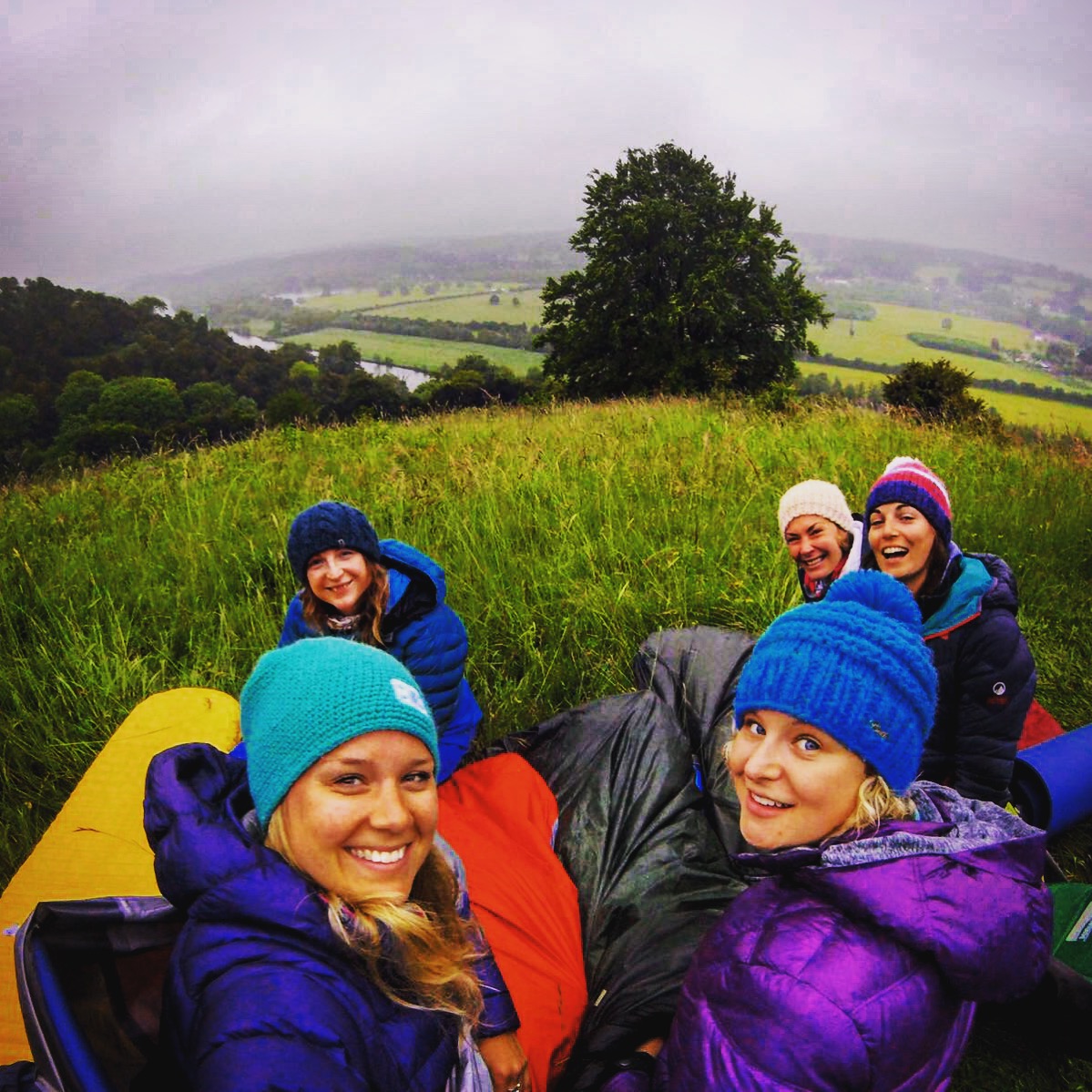
Girls night out in Oxfordshire
Adelaide: All very cool! So one question that came in was: “As a woman who’s never been wild camping before, but loves the outdoors and new adventures, what advice and tips can you give to us first timers? To help us have a safe, fun and successful wild camping adventure?”
Laura: I would say that like anything the more you do it, the more comfortable you get with it. So if you’re wondering about where to start… I started by doing it with friends over here (in the UK) and then I jumped in at the deep end. Helen obviously started doing it locally too, which is great. And it does help if you do it somewhere you can speak the language! So I would just say start. Just start. Start where you are. Camp with your friends, camp in your garden even, just do something that allows your confidence to build.
Helen: Yeaah, I’d always just say use your common sense. If you go out somewhere and feel uncomfortable where you are, go somewhere else. At the end of the day, I’ve wild camped a lot in Britain, and unless you get run down by a hoard of cows you’re pretty much not going to get disturbed. So just avoid cows and you’ll be fine (laughter).
Anna: I think it’s like any fear, the fear of the fear is ten times worse than the reality. and when you get there and you do it… the first time is a bit weird, I mean your imagination does go nuts and that’s why it’s quite nice to do it with someone else, so you’re busy chatting away, about Love Island or something, then before you know it you’ve nodded off to sleep. I don’t know about anyone else, but I get quite nervous if I feel like someone’s nearby, and so at first I’d struggle to sleep because of all of these ‘what if’s’ running through my brain. And it did actually happen on a wild camp in Essex. Someone found us, and disturbed us. And the treacherous situation, the thing I’d been fearing all that time went like this: There were these two guys, one had a torch and spotted us.
Man 1: “Wassat over there?”
Man 2: “People sleeping.”
Man 1: “Oh.”
And they walked off (laughter). That was it, the pinnacle and ultimate moment of my fears. They don’t care! No one cares! And like Laura says, just start where you can. Camp in your garden, that’s great, because when you wake up there’s mince pies and cups of tea on tap. I’ve camped in my garden loads of times. (back to the questions)
Adelaide:Do you have any advice specifically for people who want to camp solo for the first time?
Laura: I think there’s always going to be that first time you have to do it by yourself. And regardless of when it is, your brain will imagine the worst at first anyway, so you might as well get on with it. Take the initial leap wherever you feel comfortable. I mean, when I was in Russia, that first week, there was always a mass murderer outside my tent, and the reality was the noise was always a mouse..
Anna: It could have been Danger Mouse though Laura? (laughter)
Laura: That it could. That would have been worse than a murderer. (laughter)
Anna:… Or you could put some music on? If you can’t sleep… A bit of Eva Cassidy always chills me out if my brain starts to go a bit nuts. So on one of my wild camps I just put some music in and drift off to sleep.(back to the questions)

Wild camping on the shores of Lake Tekapo, New Zealand
Audience member: Sorry… when you talk about wild camping… can you actually just say what wild camping is?! Is it in a bivvy, or tent?
Laura: Oh sorry! Yes just anywhere that’s not a paid or official campsite. That’s wild camping.
Anna: Yep in a tent, or bivvy. I think we’ve all done it in both.
Helen: I usually bivvy just because it’s quicker and easier.
Anna: And it’s fine if you don’t like bivvying. I’ve got a friend who refuses to bivvy. She turns up with her tent, duvet and pillows on the back of her bike to a wild camp spot. Because that’s the way she rolls and she just prefers a tent. I actually like the bivvy bag because I feel safer, and I can see everything, and I like that feeling of a cool breeze across your nose. I also like that when you open your eyes it’s not your own sweat dripping off the tent roof onto you, but instead a sky full of stars. (back to the questions)
Anna Asks the audience: What’s your feeling on the differences between bivvying and camping?
Audience member: When I’m wild camping I prefer bivvying. I like to be hidden and I still don’t like being found. And I find it quite reassuring. Because the bivvy is so discreet. You’re just lying in the woods and no one will see you. But if I’m in a campground, then I definitely use a tent for the space.
Audience member: I think that the first few times you wild camp, you feel really big – like everyone can see you! Like the whole world is watching! Then after you do it a couple of times, you realise that you’re indistinguishable from anything else in the field. I remember the first time I did it was in a fied full of sheep, and they just didn’t shut up! (laughter). You do realise that you’re actually quite small. People aren’t going out there looking for you, and if they are then they’ve probably got bigger problems than you do!! (laughter). I think if you just keep perspective on what is really going on out there, and you change your mindset then it becomes much easier.
Anna: Yeah I agree. For me it’s always that difference between between what is the perceived risk and what is the actual risk. And so much of what we don’t do is based on perceived risk, or other people’s fears.
Audience member: I’ve also used a hammock tent (audience ‘ooooohhhs’!). Which is really discreet because it’s tree coloured. I had an experience where there was no option but to use it. I put it up right next to the trail, between trees and the fence and I felt really weird. There were all these dog walkers passing by and I could see them right there, but it taught me that no one is looking even 2ft into the woods to see you. (back to the questions)
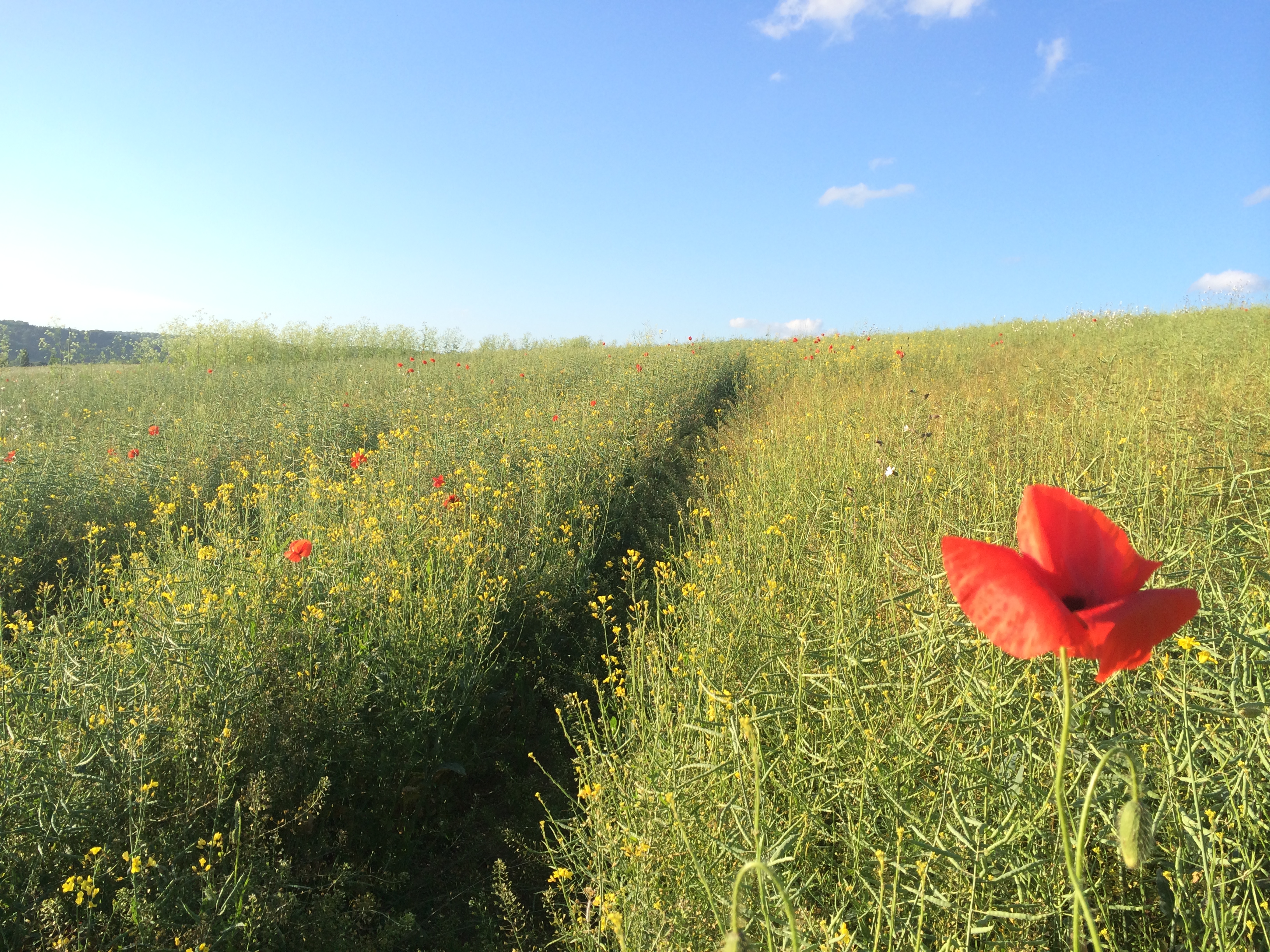
Morning view of Berkshire Poppy fields after a wild night camping in nearby woods.
Adelaide: What’s been your best wild camping experience?
Laura: I’ll go for Ireland. It was my first foray into wild camping after I’d just come back from an expedition that didn’t go so well in Russia. And so all the fears that were there first time I was out were rampant again. And I was sat there thinking ‘I need to get over this fear’. And I was petrified, being totally irrational, more than I ever was before. And a guy came over to my tent. And I thought ‘I knew it! I knew this was a bad idea!’ and actually he was just offering me some burgers! They were in a camper van up the road, and had seen my lone tent, and come to say hello. So I spent the night chatting with them and hanging out with the whole family. It was special, because it was overcoming the fear again.
Anna: My Favourite experience was we did this little ‘experience’ where I decided to spend 6 consecutive Wednesday nights sleeping out on hilltops in each of the counties surrounding London. It started with just four of us, four weirdos sleeping in bushes to be precise, and it grew to over 150 people. We kept going for 25 consecutive weeks around London. It was mental!
We culminated it right at the end with a campout in London itself. 40 of us met at a out in the West End, and because we couldn’t sleep 40 of us in one place, I mean it’s not like a Guide camp or anything, we split up into little groups of 4 or 5. We had ‘Team Campstead Heath’, Team Ali Pally, Primrose hill and Richmond Park…. and everyone was on social media sharing what was going on. Team Campstead heath had a whole mobile wine shop up there! And Team Ally Pally (which I was in), well were just getting really annoyed because there was some 16 olds shagging in the bushes and throwing up nearby! (laughter) We were all like: “It’s Wednesday night! We’re trying to go to sleep. Easy on the vomiting kids! Don’t you have school in the morning?!” (laughter)
So that for me was just an amazing experience, because we were wild camping in places that you would never think to camp. It was all really exciting and made even better by the fact that we should share in others experiences too via social media. The next morning was ace, everyone shared their pictures of the sunrise in their location… it was just brilliant.
Helen: Mine was on Wimbledon common. We were doing a Project Awesome session at 6.30am on Monday morning, and it was the day after the Wimbledon Sunday finals… So five of us decided to camp out the night before the session. We found this tree with the most elaborate branch system, it created a little woodland cave. So we just snuggled under there for the night and it was lovely. (back to the questions)
Audience member: Have you got any more big adventures planned?
Anna: I’m going to the Andes for 6 months from October, and I am crapping my pants!! I really am. I hear there’s not much water in the desert. So that’ll be loads of wild camping, and I’ve got a friend with me this time. But I’m still nervous! Don’t get me wrong it’s not so much about the camping specifically, but you always get those adventure nerves, you think “What am I doing?! Why don’t I just stay at home and drink tea and eat biscuits… like normal people?!”. But I’m really excited. And Helen, I know you’ve got a massive trip planned…
Helen: In October I’m setting off to cycle to New Zealand! So there’s going to be a fair bit of wild camping in that! (back to the questions)
Adelaide: What are the top three things to look for in a camping spot, under pressure and in the dark?
Laura: As secluded as possible, away from a main road, anywhere you could be spotted easily. And not at the bottom of a hill, in case it starts raining and you wake up covered in slush.
Helen: It’s good to get an OS map of the area, because they show you where the footpaths are and you can see where there’s a country park, or lots of fields or woods – although sometimes woods are fenced off. I like, if I can, to try and find the top of a hill. With a view out east and then you can catch the sunrise.
Anna: Yeah I think it’s just the basics… somewhere sheltered, in case it’s really windy, somewhere flat, because otherwise you end up at th bottom of your sleeping bag… and then if you’re getting really serious and on a long trip, I always look for somewhere near a water source. It’s nice not to have to trek too far to get your water… so long as you’re not then peeing in your water source of course. (laughter) (back to the questions)
Adelaide: Do you have any thoughts on the legalities of wild camping?
*silence and a few awkward giggles*
Laura: I mean, yes, it’s illegal. It’s totally illegal, but my thoughts on this are be respectful, clear up after yourself, if you don’t leave any damage and you’re respectful of your environment, and you don’t take the piss and make a big fire and have naked parties around it or whatever, then there’s no harm really done. When you leave no trace.
Anna: Yep, I agree. I don’t ever feel guilty really. And if it does get really desperate then you can always knock on a door and ask for permission. Although then you normally end up indoors, watching the Italian job, eating beef stew… (laughter) which sort of defeats the purpose of wild camping! But I just think you’re out there enjoying the natural environment, if someones got a problem with it, then fair enough, if it’s their land, but really we’re not causing any harm.
There is one thing I’d be careful about with National Trust land and that’s that they do fine trespassers on their land. The likelihood is slim, but I try to avoid National Trust land where possible, just in case.
Helen: I was once camping in this park, and I woke up in the morning and someone said that the place was going to get quite busy soon so it might be better to move on, but they didn’t have a problem with us being there, they were just looking out for us I guess. I’ve been woken up by loads of dog walkers, but they either just completely ignore us or they say hello and have a chat about what you’re doing.
Laura: Yeah I find the same. If anyone has come across me the morning, they’re mostly just curious.
Anna: I do try to go completely hidden if I can though. I sometimes just like a lie in too, so it can be 9am before I wake up! So I like to know not to be distend.
Helen: Yeah and obviously it is legal to wild camp in some places, like Dartmoor or Scotland. I even asked the National Park authorities in the Lake District, and they said as long as you’re in wild areas and not leaving a trace, then they’re fine with it.
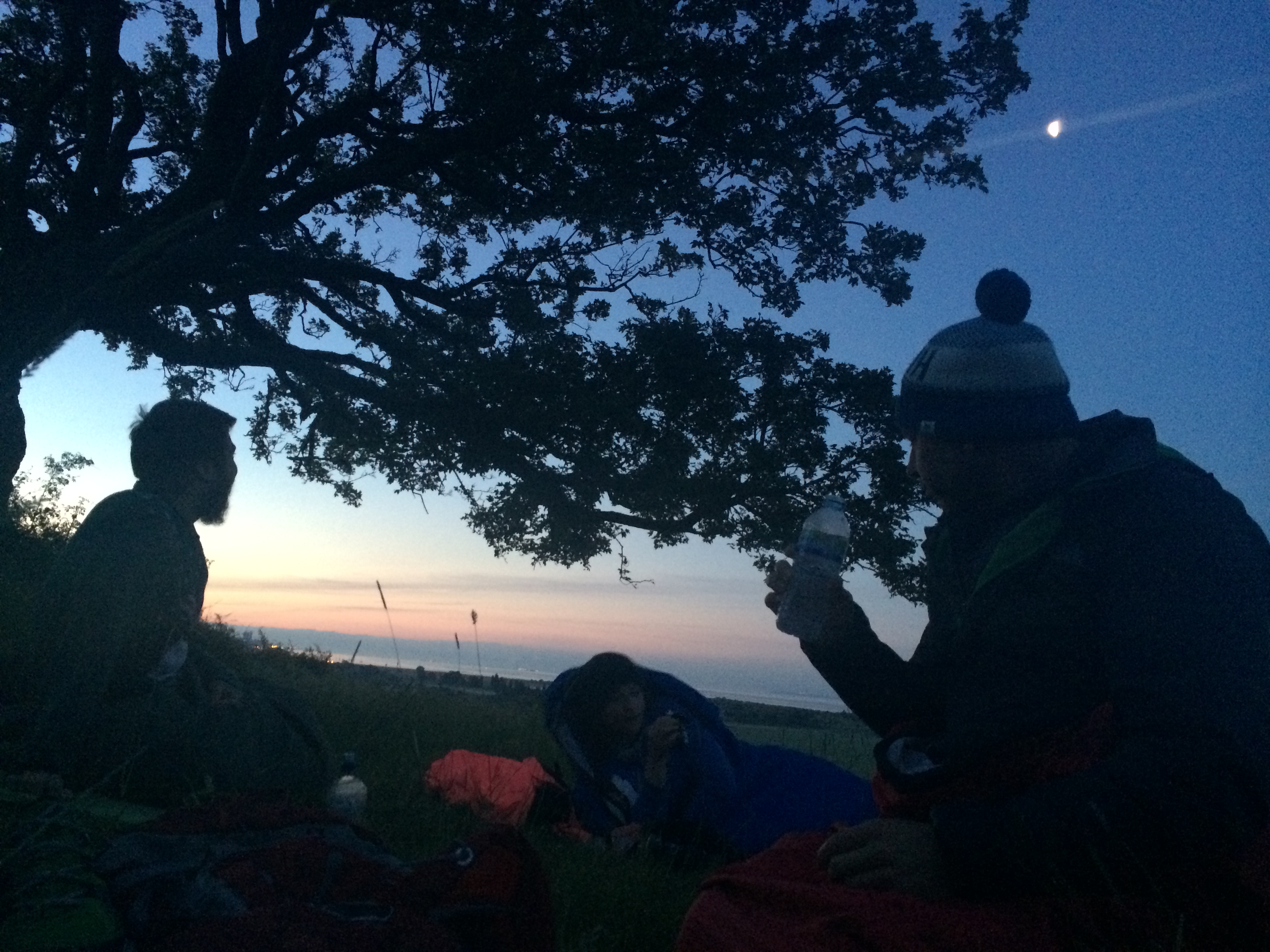
Sunrise over Essex on a wild camp
Adeleide: What are the lessons you’ve learnt from wild camping, and is there anything you wouldn’t do again?
Laura: I probably wouldn’t camp on a beach again, I mean, it sounds really romantic and wonderful, but sand just gets absolutely everywhere! There’s no shade, so I just woke up in my tent, stuck to the sides with mosquitos buzzing around me.
Anna: I camped once near stingy nettles, and I didn’t know they were there because I pitched up in the dark, so when I went for a wee at 3am I squatted down and got stung everywhere! Other than that, in New Zealand there’s this type of tree that’s a really tall California Pine. They’re really bendy. It was a really windy night, and I thought I’d camp in the forest because there were loads of soft pine needles on the floor, which is camper’s heaven, like a spongey bed. I woke up in the morning and I was just taking a video and messing around and then I heard this massive craaaaack! the tree next to me split in half and went ‘Booooof!’ as it hit the floor right next to my tent! I thought ‘oh man! This was a silly idea!’ So I think I’d be more careful about camping under certain trees in the wind.
Helen: I probably spend too much time camping next to footpaths. Because sometimes you have to go quite a long way to find a spot, and I’m tired. So yeah… I’l probably try and stay a bit away from them in future. (back to the questions)
Audience member: How do you choose where to go? How do you even start to plan an adventure??
Anna: I love a reason to go somewhere. Like sleeping out in the counties out around London. If you google things like ‘most romantic spot in…’ or ‘best views in…’ then that brings up some good stuff. Or there’s there’s this website called slope hunter. It’s for people who launch planes off slopes! (laughter). I know! But I’m so grateful to these people because they’ve written about where the best slopes are around the UK. And they’ve included how to get there, which is important because more than 3 miles from a train station if you’re on foot just gets a bit of a schleck. And then when I’m deciding where I actually camp, I just do it by feel.
Laura: Yeah I would say that mine is about looking for opportunities. Like if I’m going to a wedding… I haven’t been out for a while, I get a bit chlostrphobic. There were a group of us that hadn’t seen one another for a year, so we just out a date in the diary and found a place that was equidistant from our homes.
Helen: Yeah… I have a habit of spending too much time looking at maps. So I’ve done a few cycling adventures based on place names. I’ve cycled from Ham in Dorset to Sandwich in Kent (laughter). I went via cheese lane, and I went via Rye to get some bread… (more laughter). And I ate a ham sandwich at both ends. I’ve also cycle from Somerset to cumbria, via four places named Wellington, and one named Boot. (laughter).
Anna: Were you wearing Wellington’s the whole way?!
Helen: I was for the last section. And I had the map drawn on my boot so I could explain it to people I met. And another one, I cycled from ‘sauce to sauce’. So I cycled from The Lea and Perrin’s factory in Worcestershire to the houses of parliament, for HP sauce.
Anna: I also do it if I need to stay somewhere, but it’s going to be getting in late and getting up early. If there’s anywhere Green and I can save myself the cost of a hotel room for the night, I’ll do it.
Laura: Yeah that’s probably the one I do most too! (back to the questions)
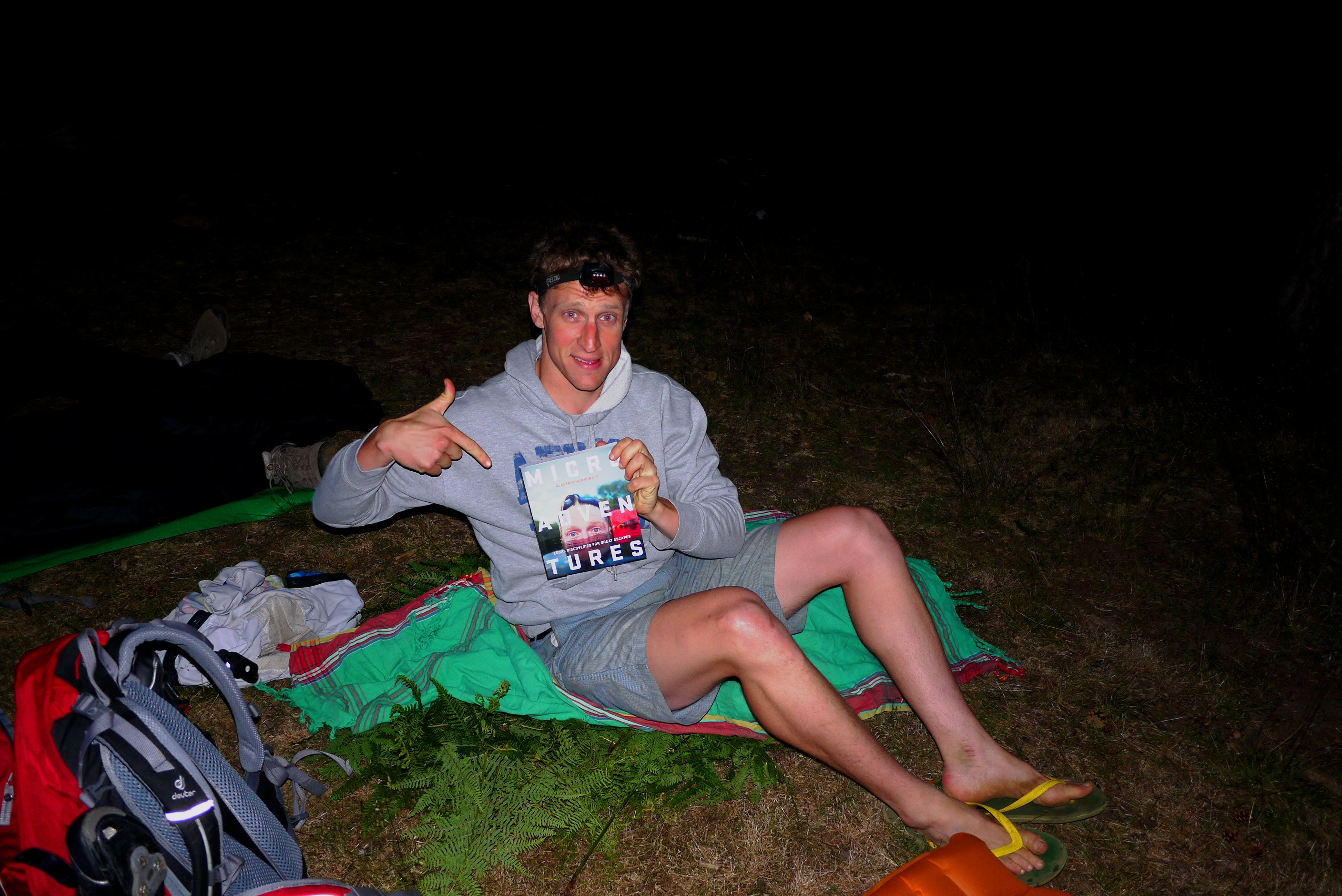
Paddy, who forgot his sleeping mat and made a bed from ferns instead
Audience member: Do you wait until nightfall to set up, or do you just do it whenever?
Laura: I normally what until it’s dark to go to the spot, but if I know the area’s really quiet I’ll just sit in the spot for a bit, and set up when it gets a bit dark.
Anna: There was this one night in New Zealand, where I found a spot in the woods, but I was determined to wait until it got darker. So I sat watching the road from the woods for 10 minutes, I watched it like a hawk! Then I realised no one was watching me… and I really wanted some noodles, so I thought ‘stuff it’ and set up then! I think it depends how well people can see me.
Helen: Unless it’s a full moon. When its a full moon you lie there thinking: ‘why can’t someone just turn the flood lights off?’ It’s crazy! (back to the questions)
Audience member: I have a practical question about keeping warm. Do you have any good tips on keeping warm?
Anna: I really love my Merino longsleeve. Then if it’s really cold, it’s normally my back that gets cold first so I wear a down jacket, one with sleeves or a body warmer without. That and a hat! That makes such a difference.
Laura: Also fleece trousers. I discovered them when I was sailing, you can get them really cheap from Decathlon. They just feel like getting into pyjamas. And a cheap down jacket. And yeah, Merino is amazing too. Also a silk liner for your sleeping bag. All these little things make quite a big difference.
Helen: I just have a massive sleeping bag! It’s heavy to carry but it works.
Adelaide: I’ve just bought an all season NeoAir extra therm. Because I thought I’d splurge on my sleeping mat. I’ve had the most rubbish sleeping mat for so long, and then it broke, and I thought “YES!”
Anna: Did break with a pair of scissors in your hand? (laughter)
Adelaide: Don’t tell everyone! And it rolls up to the size of a water bottle. And when you lie on it it feels like a lilo. Some pole don’t like it, but I used it when I was in the Himalayas and I’m always normally so cold. And this is just air… but I could actually feel the heat coming through me. It’s something to do with the way the way the air moves around it.
Audience member: Yeah I heard it’s always a good idea to to double down when you can. So a down jacket inside a sleeping bag… that really works. And I normally get super cold around my torso, and on my knees. So I always put down around my knees too! And if I have a gap at the bottom of the sleeping bag, I fill it with clothes.
Anna: Oooh and sailing leggings are also really good. I discovered them in New Zealand. They’re made from Polypropylene and they’re warm even when wet. And they dry really quickly. You can get them from sailing stores. They’re about £20… not the most attractive thing, they have this weird crotch seam and I wondered whether I in fact needed a penis to buy them? (laughter) but they’re awesome. (back to the questions)
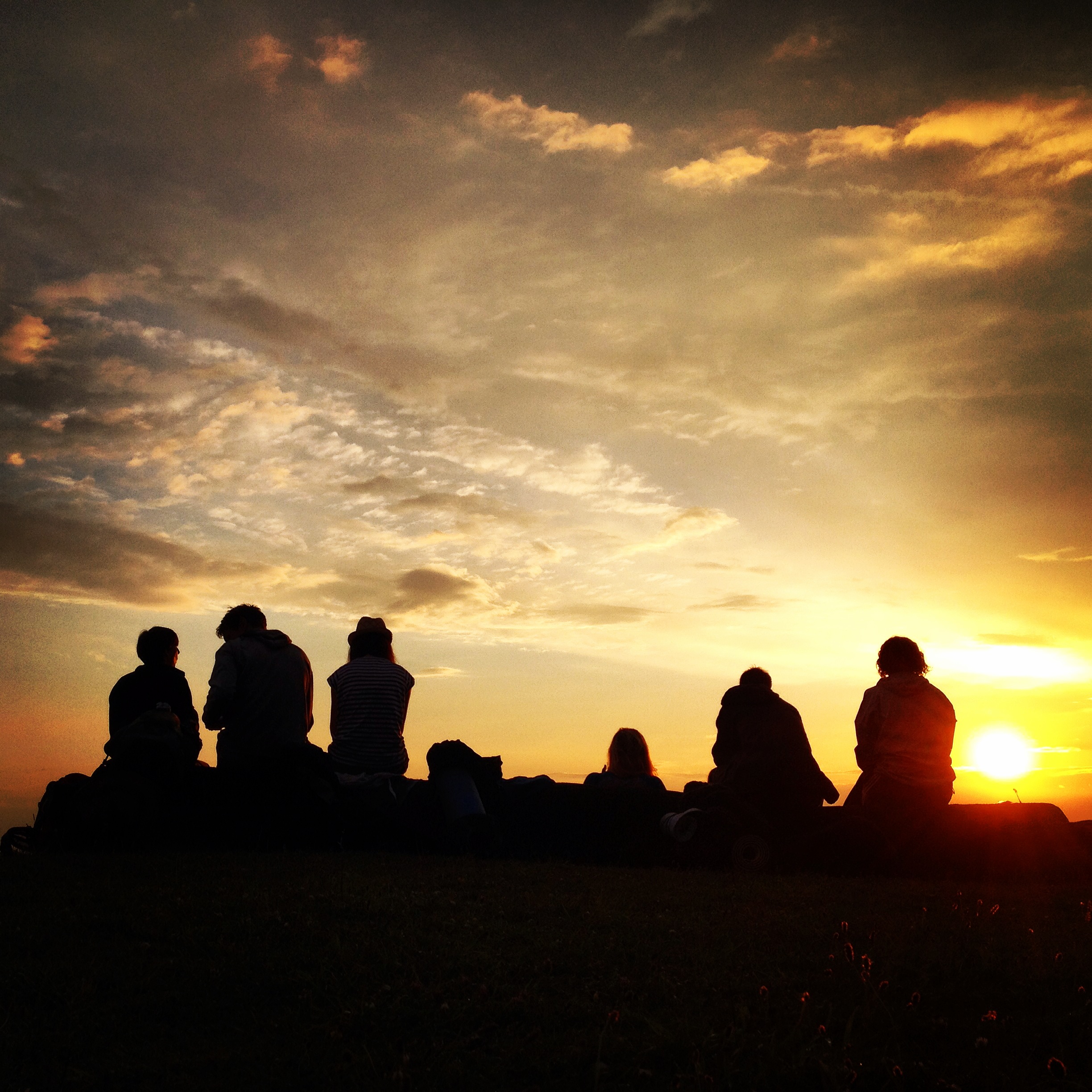
Sundown over Buckinghamshire
Audience member: If you had to pick one piece of kit to spend your money on, what would it be?
Laura: I think you can get away with a cheaper bivvy bag, you might get a bit of condensation on the cheaper ones, but that’s okay. You do notice the difference on a cheap sleeping mat though… I’ve got the NeoAir thermarest, and it makes all the difference. And a sleeping bag too, that makes a massive difference, and worth it not to be frozen solid and to enjoy it.
Anna: I’d always go for a good hat. That keeps in so much warmth and is like being tucked in for the night. It’s the one thing I couldn’t go without.
Helen: Yeah I’d say a really good sleeping bag. (back to the questions)
Audience member: On longer adventures, how do you about planning for food or water, and how much to take?
Laura: I use Google maps. Especially if it’s a route that doesn’t follow a trail. You can find out an awful lot by looking at what towns are nearby. And I always carry a bit extra, like if I’m kayaking. You never know when you’re going to get held up. If there’s bad weather, so I’m always thinking about how many miles I’m going to covering a day.
Anna: The more adventures I do, the less I plan. I think there’s a balance to be struck between being naive and planning. You’re not going to use 90% of what you plan anyway. And if you’re too naive you can end up in a sticky situation, so if it’s a long trip, I always just plan a week ahead. I can’t cope with more than that!
Laura: Yeah I’d agree. Do just about enough to know you’re safe, but don’t stress.
Anna: And I always have 1.5 litres of water spare if it’s long trip, just in case. (back to the questions)
Richard from Moju: What do you do about insects? The mozzies? They go after me like nobody’s business!
Laura: I have a buff. For those that don’t they’re a fabric scarf. There’s one with insect repellant in it, and especially because I do a lot of journeys by rivers, I find it quite helpful.
Hugo: Are you worried about using Deet then?
Laura: Well lots of my trips are a few months long, and I don’t really want to be dousing myself with Deet all that time. I know there’s natural alternatives too, like mint. But the fabrics that have it woven in are useful.
Helen: You can get bivvy bags with netting over the top too. I just grin and bear it really.
Laura: Earplugs are good as well too, so you don’t hear the flys and wasps all night. (back to the questions)
Audience member: What are the most extreme weather conditions you’ve ever camped out in?
Anna: I don’t think I’ve ever been too extreme… mine was minus 7 degrees, but it was only on the South Downs Way. And I was fine, but my poor friend… I kept having to wake her up and check on her, because I thought she was seriously going to get hypothermia. I could hear her shivering all night. The worst thing was that when I got out in the morning and my cycling shoes were frozen solid, as was the Toffee Crisp we’d brought for breakfast. Nightmare. (laughter)
Laura: I don’t think mine was much worse than that temperature either.
Helen: I think mine was probably just waking up in a puddle! My bivvy bag is totally waterproof so I just woke up, realised it had been raining all night, but thought ‘Oh, I’m fine!’
Anna: Yeah that’s another thing. I think people get out off by bivvying in the rain, but so long as your bag is waterproof, you just pull it over your head and go back to sleep.
Helen: Yeah I just sleep on my side and poke my face out a little bit. So I get a wet nose… a bit like a dog (laughter) (back to the questions)
Audience member: I have a practical question. I get lost all the time and I run out of data and battery on my phone. What do you use to… not be lost?!
Laura: I use this big grey thing here. *Lifts up a battery pack* It’s a battery bank that I got from maplin. I’ve got solar chargers and stuff but this is great. It’ll last me about a week. It’s not super light, but it does the trick.
Anna: Yeah I’ve got a little one called a pebble explorer. That was £40 and is really small, so I just always have it in my bag. And I always put my phone on airplane mode, and use my GPS to save battery.
Helen: I just always go to a pub in the evening and charge up!
Anna: There’s also an app called View Ranger. You download it on your iPhone and it gives you free standard maps, but then you can also download OS maps over the top. It costs fiver for 300 tiles worth. If I’m ever anywhere new and looking for trails or somewhere to go wild camping – that app really helps to find cool spots. Where the forest areas are, and all the footpaths and bridleways. And it’s so cheap – you only download the tiles you need. My tiles are still going strong after 1/2 a year!! (back to the questions)
Audience member: What home comforts do you take with you?
Anna: I love my Thermarest pillow! Unfortunately it’s the first thing that gets thrown out if I’m short on space. But it’s lovely. There’s a massive difference between putting your head on a crunchy backpack, and on a nice soft pillow. That’s my luxury. And chocolate.
Helen: A waterproof bag to keep all my clothes in!
Laura: Something to make a nice cup of tea in the morning! (back to the questions)
Audience member: What do you do to get clean water??
Laura: I’ve got a Water-to-go bottle. I’ve drunk river Thames water from that and had no problems.
Anna: I never treated any water in New Zealand, because most of it is fresh and glacial. But I do always carry iodine tablets, just in case. (back to the questions)
And that’s a wrap. Thanks for reading, I hope this has helped you
Keep up to date on Lily Wild’s activities here, or join her Facebook group here.
For other great sources of Wild camping info, check out Alastair Humphreys or Phoebe Smith’s websites.
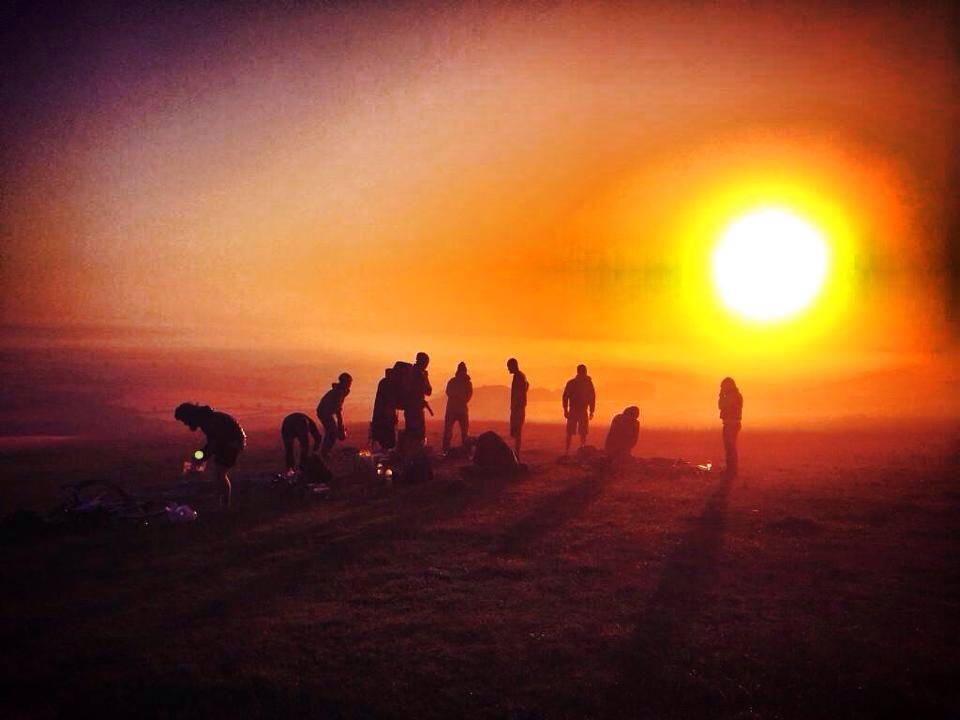

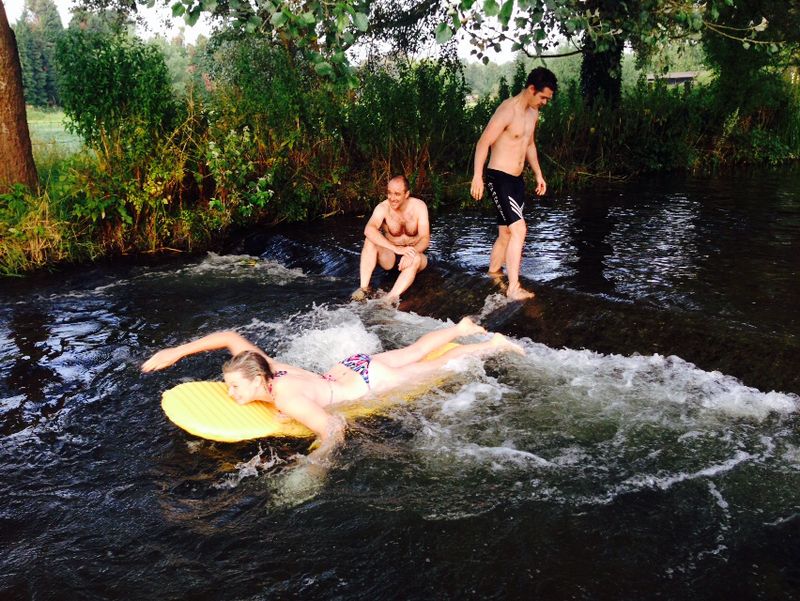

Trackbacks/Pingbacks